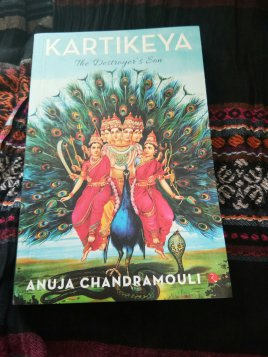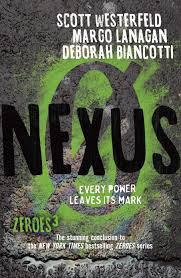
I chanced upon this book when the author approached me through my blog. I am going to say I am quite fortunate to have been found by her. This discovery wouldn’t have happened otherwise. I had almost given up on mythological fiction by contemporary authors.
I am delighted to say that Anuja Chandramouli’s story-telling was a breath of fresh air in the stale bygone mythological perspectives that have long been told since centuries.
Anuja, in her book about the lesser-known sibling of the effervescent Ganesha, touches upon various ancient as well as coming-of-age themes like good vs. evil, familial feuds, the meaning and importance of letting go, values and principles. The language is lyrical and certain passages, when read aloud, sound almost mystical owing to some brilliant usage of words.
Indra has lost his throne to Soorapadma, one of the three sons of Maya. The three asuras are wreaking havoc on the earth and the one destined to end this havoc is yet to be born. Shiva is still reeling under the impact of the loss of his beloved Shakti and despite she being returned to him in the form of Parvati, it is becoming hard for him to consummate the marriage. The story takes us through the forced yet powerful birth of Kartikeya, owing to the impatience of devas, and to his further life where he performs the deeds he was destined for.
History is always written by the victors and naturally the loser’s point of view is always lesser known and many times, bitter. Anuja’s book gives it its due importance. Evil has its principles too and most often than not, the victor is more likely to play the dirtier game. So who wins eventually?
“He was Soorapadma, one of the greatest warriors in the history of the three worlds and while he was no saint, he drew the line at spying on the love-making of newly-weds and hatching nefarious plots to prevent the conception of their children. That sort of vulgar depravity was exactly the sort of thing his nemesis, Indra, was capable of stooping to, but he would be damned if he was going to cower in fear over an unborn child. Even if the said infant was born to Shiva for the express purpose of killing him.”
Indra, despite being a God, is conflicted in his ethics and morals. So was the evil one taking a high moral ground here or just being arrogant?
“It is too bad Mother forgot to tell us that getting your heart’s desire is oftentimes the worst thing that can happen to you.”
Here the ‘Mother’ is Maya. Someone who seems to have fed her sons with hate since their conception. Raised them with the sole aim of defeating the devas. So who is perfectly happy? The one who has all or the one who doesn’t?
“You are not dithering but merely teaching them an invaluable lesson on the futility of waiting for heroes to come to the rescue when they should be expending all their strength and energy on making better lives themselves.”
Should one wait for the leaders to guide them out of their problems or put all that effort in pulling themselves out?
Above few and some more philosophical questions have been reflected upon in the book subtly. Apart from the somber ideas, Anuja has put in some lighter elements in the book too, in the form of the characters of Chitra, the peacock who is the vehicle of Kartikeya in addition to being a dear friend, and Ganesha, who takes form from Nesha at a later part (something I kind of disliked at a fundamental level – I mean why would Shiva turn his daughter into a son later – but I let this go for the sake of the story! Any leads on this will be appreciated). Both these characters use entertaining and sardonic dialogues and hence are quite fun whenever they appear. The sibling relationship between Kartikeya and Nesha and later Kartikeya and Ganesha is also very beautifully portrayed.
Portrayal of women/feminine in mythological narrative has always been a problem area for me, personally. I understand the argument, ‘Oh that was a patriarchal time!’ (Not that it isn’t now), but I don’t buy it much. Divakaruni wrote a powerful Draupadi. Shivaji Sawant wrote a powerful Kunti and Vrushali. Volga wrote powerful Sita, Shurpanakha, Ahalya, Urmila, Renuka. It is possible. Their fates may remain unchanged but the way they deal with it can be narrated powerfully. Which is why I said Anuja’s book was refreshing!
In her story, Ajamukhi, the sister of the Asuras, stands her ground with unyielding determination, when confronted by Indra and his wife Sachi, despite knowing that she is going to be used as a pawn in the fight between Devas and Asuras. The six Kartikeyas who foster Kartikeya, assume a warrior form to fight any hurdle they might face in bringing him up. Ganga, Kali and Shakti might have a very little role to play in this story but we know their feminine energy is not one that can be tamed without their wish. Nesha, who is the initial form of Ganesha, the daughter of Parvati, doesn’t once allow her father to put her mother down.
“Go away, you beast! My mother, greatest of the Goddesses, deserves better than you! Leave now before I am forced to kill you.”
Devasena, Kartikeya’s wife, doesn’t falter when guiding him with her wisdom and he doesn’t hesitate asking that from her. Parvati, in this book, is surely the all-sacrificing mother like we know already, but she is ferocious, takes firm stands and doesn’t hesitate at all to show Shiva that he is nothing without her.
“Shiva gathered her in her arms, no doubt assuming that by mouthing inane platitudes and making love to her he would be able to kiss away the cares that beset her and restore her equanimity he liked best about his wife. After all this time, he still did not know her as well as she knew him. It was infuriating and made her want to hug him and hit him the same time.”
“My daughter is gone! I cannot forgive you for this and this time you will pay for your arrogance.”
Glaring patriarchy is questioned by every woman. Resignation doesn’t happen and if it does it is after putting up a good fight. That resignation also marks a victory because they cripple others in the wake of it. And none of it has happened by twisting the narrative. It has happened with the story firmly in its place.
“Chaos must be allowed to reign supreme if calm is ever to be restored”
I had only one grouse. I would have loved to read some more event-narration. The ups and downs were happening quickly. It all started and ended too quickly too. This could have been even more epic if some more events would have been discussed in depth. Nevertheless, nothing stops me from asking Anuja Chandramouli to take a bow, simply because some of the events and dialogs without a doubt gave me gooseflesh.
If you want to read a mythological fiction about a God less narrated in contemporary mytho-fiction, pick this one up. I, for one, am definitely going to hunt down other books by the author.
Advertisements Want to Share this?:





